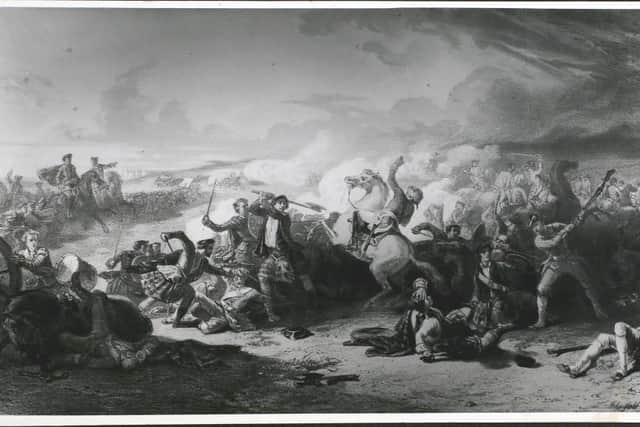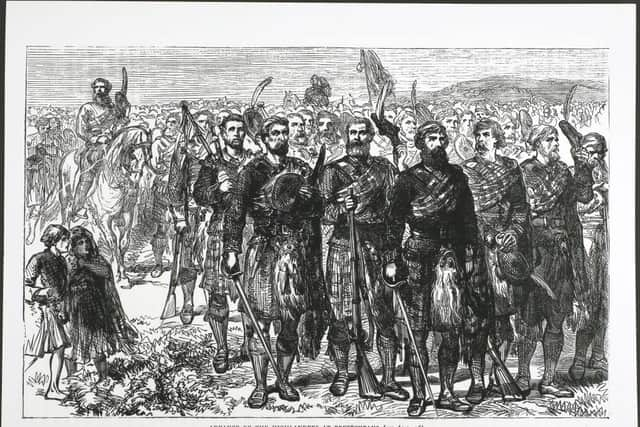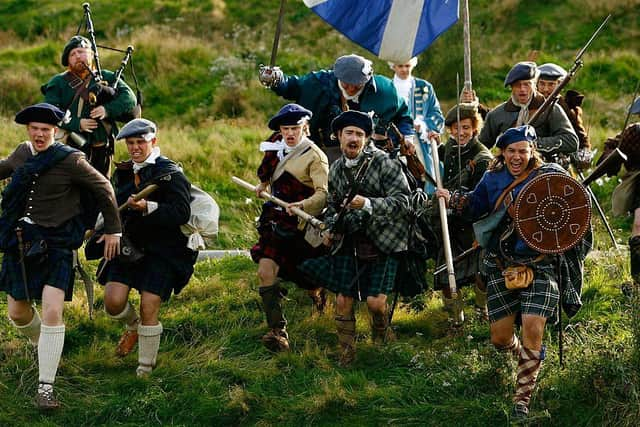‘Battle of Prestonpans’: Today marks anniversary of famous victory for Bonnie Prince Charlie in 1745 Rising
and live on Freeview channel 276
Today marks the anniversary of one of the most significant battles in Scottish history, when troops gathered to support Bonnie Prince Charlie’s 1745 uprising, crushed an inexperienced government force at Prestonpans, in East Lothian.
Mythologised by Robert Burns and Sir Walter Scott, the victory became a symbol of Scottish resistance to British government rule, and of the negligence of Hanoverian military commanders.
Advertisement
Hide AdAdvertisement
Hide AdAt 6am on September 21, 1745, 2,000 men drawn to the cause of Prince Charles Edward Stuart - the “Young Pretender” - clashed with a larger force of some 3,000 government troops under the command of Sir John Cope close to the Firth of Forth in East Lothian.


Cope’s men, originally facing South, were forced to rapidly wheel around to face the Jacobites, who charged unexpectedly from the East.
British dragoon regiments, stationed on either flank of Cope’s infantry, abandoned their posts soon after fighting began, leaving the foot soldiers dangerously exposed.
Surrounded on three sides, the remaining Hanoverian force was swept aside in a little over ten minutes.
Advertisement
Hide AdAdvertisement
Hide AdHundreds of government troops were killed or wounded, and a further 1,500 taken prisoner by the Prince’s men.


Cope, along with just 450 survivors, managed to reach Berwick-upon-Tweed the next day.
The Jacobites, who suffered the loss of fewer than 100 troops, also captured £5,000, as well as a huge cache of muskets and ammunition.
Professor Ewen Cameron, Head of the School of History, Classics and Archaeology at the University of Edinburgh, argues that the victory was even important in psychological terms.
Advertisement
Hide AdAdvertisement
Hide Ad“The victory gave them the confidence to move South,” he told The Scotsman,” but it perhaps gave them an unwarranted feeling of invincibility that tipped over into complacency on the part of some senior Jacobites.”


“It was a major wake up call for the Hanoverians too,” Professor Cameron said, “and wake up they certainly did.
“Large numbers of battle-hardened troops were brought home from Europe and from Ireland.
“The defeat gave more authority to those leading whig politicians, like the Duke of Newcastle, who had been arguing that the Jacobite threat should be taken seriously.”
Advertisement
Hide AdAdvertisement
Hide AdThe embarrassment at Prestonpans “stiffened the military and political position of the Hanoverians,” he added.
But while the rout took just a few minutes, Jacobite commanders had been far less confident about victory in the days leading up to it.
“There had been a few skirmishes, including at High Bridge in Lochaber in August,” Professor Cameron, “but this was the first large-scale confrontation with a sizeable Hanoverian force.”
“The Hanoverians were professional soldiers, infantry and dragoons,” he added, “the forces at Cope's disposal were - or should have been - competent.”
Advertisement
Hide AdAdvertisement
Hide AdIn contrast, contemporary accounts emphasise the role of poor Highlanders, who marched south with Prince Charles, in the Jacobite force.
“Most soldiers in the ranks were from the lower end of society,” Professor Cameron explained, and the stakes could not have been higher for them.
“If the Jacobites had lost it would have been game over,” he argued, “especially since there was much dissension among the senior Jacobite commanders in the hours before the battle.
“They were perhaps a bit lucky to be able to exploit local knowledge, and be able to take the Hanoverians by surprise.”
Advertisement
Hide AdAdvertisement
Hide AdSeveral accounts of the battle emphasise how spooked Cope’s men were by the Highlanders, as well as their struggle to deploy heavy cannon and cavalry that should have given them an advantage.
Cope is said to have been so frustrated by his artillery units that he dismissed them and sent word to Edinburgh for replacements. They did not arrive in time.
Despite being cleared of any negligence at a court martial in 1746, Sir John Cope’s reputation as a military commander was destroyed by Prestonpans, and never recovered.
Immortalised in Adam Skirving’s famous Scots song “Hey, Johnnie Cope, Are Ye Waking Yet?”, Cope was characterised in contemporary accounts as a coward and a buffoon - a fact Professor Cameron called “a bit unfair.”
Advertisement
Hide AdAdvertisement
Hide Ad“He may have been a poor leader but not a coward,” he said, arguing that his negative image was “very much constructed after the event.”
Skirving's song did much of the damage, but Burns also published a version and there wasn't much of a counter-narrative in his favour.
“Scott also romanticised the battle in his novel, Waverley - poor old Cope's reputation never really recovered.”
The site of Cope’s defeat - and the Jacobite’s surprise victory - has been listed in the Scottish Government’s national inventory of significant battle sites when that was established in 2009, and re-enactments of the fighting regularly take place.
A cairn in memory of the battle was erected in 1953.
A message from the Editor
Advertisement
Hide AdAdvertisement
Hide AdThank you for reading this story on our website. While I have your attention, I also have an important request to make of you.
The dramatic events of 2020 are having a major impact on many of our advertisers - and consequently the revenue we receive. We are now more reliant than ever on you taking out a digital subscription to support our journalism.
Subscribe to scotsman.com and enjoy unlimited access to Scottish news and information online and on our app. Visit https://www.scotsman.com/subscriptions now to sign up.
By supporting us, we are able to support you in providing trusted, fact-checked content for this website.
Joy Yates
Editorial Director
Comment Guidelines
National World encourages reader discussion on our stories. User feedback, insights and back-and-forth exchanges add a rich layer of context to reporting. Please review our Community Guidelines before commenting.